- Home
- Kristen Simmons
Article 5 a5-1 Page 10
Article 5 a5-1 Read online
Page 10
“Are there lots of rebels?” I liked the idea of people striking against the MM. I wondered what they planned to do with the uniforms.
“Occasionally someone gets it in their head to steal a rations truck, but not often,” he informed me. “Mostly it’s just anarchy. Ripping up the Statutes, attacks on soldiers, mob riots. Things like that. Nothing that can’t be managed.”
I frowned at his confidence. There had been a time he was much like the people he now denigrated.
“The overhaul of Kentucky, West Virginia, and Virginia is nearly complete. Oregon, Washington, Montana, and North Dakota will be overhauled beginning June one, with estimated compliance by September….”
Anticipating my questions, Chase explained that an overhaul was when the MM systematically went through a city’s census to weed out Article violators.
“It’s what they did to you,” he said.
For a fraction of a moment his eyes flickered with pain, and I found myself glad that some part of him felt guilty for what he had done. The mention of the arrest had triggered my hands to fist in anger, and I had been fighting the urge to hit him again.
“It’s a tedious process,” he continued. “It takes a lot of manpower. All records—medical, employment, anything you can think of—are reviewed. Anyone who’s not in compliance with the Statutes is subject to sentencing, or is automatically sequestered.”
“Sequestered?” I felt as if I were talking to a stranger rather than someone I’d known my whole life.
“Put into federal custody. Like you were.”
“What happened to tickets and fines?” I remembered the night we’d received a citation for an old pre-War fashion magazine my mother had hidden under her mattress. “Lewd Materials,” the sheet had said. “Paper Contraband— $50.00”.
“They’re history. No one can pay them.”
I’d complained about this to him when he’d come home from Chicago. I hadn’t at the time considered that this would be the alternative, or that Chase would be a part of it.
We listened to a list of missing persons. I held my breath, but my name was not spoken. Chase’s forged documents had worked. Brock still believed I was on an overnight pass. When the report ended, Chase flicked off the radio.
Dusk was imminent; the sky had already tapered to a dull gray. I sighed apprehensively. We were going to have to look for a place to stop for the night, which meant the hours we could be traveling would instead be spent hiding somewhere just over the Pennsylvania border. It seemed like an insurmountable waste.
A road sign appeared on the right. The white paint stood out in sharp contrast to the metallic background.
RED ZONE
I could feel Chase tense across the cab.
“What’s a Red Zone?” I hadn’t heard the term before.
“Evacuated area. Like Baltimore, DC, all the surrounding cities. Yellow Zones house FBR bases. Red Zones are deserted.”
It struck me just how small my world at home had been.
“This is new,” he added. It was clear from his tone that he hadn’t intended to cross into an evacuated zone on our way to the carrier.
As we neared the sign, a car, hidden behind a tangle of brush, was revealed.
A blue car. With a flag and a cross on the side.
All at once, every nerve in my body screamed danger. We couldn’t stop and turn around, because it was too late. Though Chase was driving the speed limit, the MM highway patrol pulled out onto the road behind us.
A moment later the bar of lights on the cruiser’s roof flashed to life and a loud siren pierced the air.
CHAPTER
6
CHASE swore. Loudly.
My mind raced through the possibilities. Brock had figured out what had happened. Chase had underestimated his time before the MM came after him. We’d been seen together at the gas station.
This couldn’t be happening. We had to get to South Carolina. My mother was waiting for us.
“Can you outrun them?” My question was met with a withering look. “Go!” I shouted.
“Ember, listen. Reach in the bag behind the seat. There’s a weapon in the bottom zippered pouch. Give it to me,” Chase ordered.
I hesitated.
“Now!”
I jerked upright and stuffed my hand as smoothly as I could into the pack.
“Easy,” he cued.
“I know.” Anyone behind us would be able to see through the back window of the cab. My fingers found the zipper. I pulled it aside, feeling something solid and cold rest against my palm.
“Oh…” A knot lodged in my throat.
“Hurry up,” he said sharply.
Very slowly, I pulled the handgun over the seat, hiding it from the window with my arm. I dropped it on the leather between us, retracting my hand immediately. Without the holster covering it, the exposed gun looked lethally ominous. The way it had looked in the woods, aimed at my chest.
Chase must have removed it at the gas station when he’d changed. He hid it now in his belt, beneath his flannel shirt.
“If I tell you to run, do it,” he said. “Go straight into the woods and don’t look back. Do not, under any circumstances, let them find you.”
I shuddered. I’d suspected that I would be thrown back into rehab if I was found, but Chase’s tone scared me. It insinuated something far worse.
My mind was reeling. He wanted me to run. To leave him alone with the soldiers when I was the reason his life was at risk. But I couldn’t have Chase’s imprisonment on my conscience. Not after what I’d done to Sean and Rebecca.
But I had to get to my mother. That was my only priority. Wasn’t it?
“What are you going to do?” I asked as the truck’s speed decreased.
He didn’t answer.
As much as Chase had changed, as much as the darkness in his eyes unsettled me, it seemed impossible that he would consider killing someone. Still…
I snatched the blanket out from behind the seat and covered my skirt. I hoped that the soldier wouldn’t know that my sweater was part of a reformatory ensemble. It looked mainstream enough.
Chase pulled onto the side of the road and turned off the vehicle, blocking the wired area below the dash from view with his knees. I glanced at his navy uniform pants and hoped the patrolman didn’t look down.
The seconds passed with biting intensity, until finally a soldier stepped out of the passenger side of the cruiser. The sound of the door slamming was as loud as a cannon firing in my ears. In the mirror I saw that another stayed behind in the driver’s seat.
The man that approached was older than most of the soldiers I’d seen, with a stark, silver comb-over that topped his weathered face. He sauntered to the front door and motioned for Chase to roll down his window. In my peripheral vision, I watched my companion’s every move.
“License and registration,” the soldier said, just like the cops used to say before the MM took over. There was a handheld scanner in his right hand.
Chase reached across my lap to open the dash. When his forearm rested on my knee, the warmth from his skin spread up my leg, and my sharp intake of breath smelled of soap and home and safety. The feeling faded as quickly as it had come. He grabbed a thin piece of paper the size of a note card and handed it to the officer.
“Sorry. A soldier took my ID during our last inspection. Said it was part of the census. He said I could still drive.”
“Yeah, yeah,” nodded the highway patrol, as though this were a commonplace occurrence. I remembered the way Bateman had tucked my mother’s ID into his pocket during her arrest.
The soldier scanned the bar code on the registration and squinted at a tiny screen, presumably checking for outstanding warrants. I was ready to crawl out of my skin.
“Lucky there’s a freeze on car payments, Mr. Kandinsky. Your registration’s expired. Three years.”
Chase nodded. The soldier handed back the registration.
“So, where you headed?” he asked. �
��Town’s cleared. Been empty for months.”
My hands squeezed each other with bone-breaking intensity. I flipped them over to hide the bruises.
“I know,” Chase lied smoothly. “My aunt’s got a place just down a-ways. I told her I’d check in on it. We’ve got a pass.”
“Let’s see it.”
Chase reached into his pocket. Just beside the gun. I turned to face the opposite window, eyes squeezed shut. My fingers clenched in the blanket as I braced for the gunfire.
He’s going to do it, I thought. He’s going to shoot this man.
“I saw it in your jacket pocket,” I blurted. Soldier or not, this man had done nothing to us. Chase shot me a scathing look.
“This your girlfriend?” asked the soldier, finally registering my presence. His eyes were roaming over my hands. I forced them to steady.
“My wife,” Chase answered between his teeth.
Yes, of course. An unmarried couple would be issued an Indecency Citation for spending time alone together so close to curfew. It occurred to me the soldier had been looking at my hands for a ring. If we lived through this, I’d have to find some cheap jewelry.
“Good thing,” he commented. My stomach twisted.
Chase looked at me. “In my jacket? Really?” He winced. “Damn. I left it at home then. I’m sorry, sir.”
“What was the number?” the soldier tested.
“U-fourteen. That was it, wasn’t it honey?”
I nodded, trying not to look petrified.
“It was a blue form, about this big.” Chase motioned with his hands the size of an index card.
“Yeah, that’s the right form.” The soldier bounced the scanner in his opposite hand, thinking. “I’m letting you off the hook, but make sure the next time you venture into an evacuated area, you have a pass, got it? You’ve got twenty-four hours.”
“Yes, sir,” said Chase. “Thank you, sir.”
A few minutes later, the cruiser disappeared behind a turn in the road.
“Oh. Wow.” The words were sticky in my throat.
“Old bastard can’t even do his job right,” Chase said. “The regs clearly state you can’t allow a civilian to enter a Red Zone without a U-fourteen. Everyone knows that.”
“Thank God he didn’t!” I practically shouted.
Chase lifted a brow. “Well. Yes.”
A somber fog settled over us. I couldn’t help wondering what Chase would have done had I not said anything. I knew by his demeanor now that he hadn’t intended to shoot him, but I also knew he hadn’t taken the option off the table.
Nothing happened, I reminded myself.
But tomorrow, after we’d been registered missing, this scene would play out very differently.
It was time to get off the road.
* * *
WE drove through the empty streets of the Red Zone, hunkering down on an old hunting path beneath the charcoal sky. We hadn’t seen any more cruisers, but Chase said that they patrolled Red Zones to manage crime, and after our run-in with the MM, I wasn’t eager for a replay.
Still, waiting for dawn wasn’t any easier.
I made peanut butter sandwiches to busy my hands, and told myself that it did no good to focus on how we were sitting around while the clock on our safety dwindled down. There was nothing we could do until curfew lifted.
Chase took the sandwiches hesitantly when I shoved three his way.
“I didn’t spit in them,” I told him, long past feeling offended. His brows, arched in surprise, returned to their normal scowl. He may not have been used to someone taking care of him, but I felt compelled; making dinner was my usual chore at home. The reminder, sharp as a knife, brought on a new wave of desperation.
“I have to show you something,” he said, as if to reciprocate for the food I’d made. He went outside, sending a blast of cold air into the cabin of the truck, and reluctantly, I followed with the flashlight.
My breath caught when I saw the silver barrel of the gun emerge from his waistband.
It was too dark, and the woods smelled too heavily of dead leaves and earth. A sick sense of dread emptied my mind of the present and took control of my senses. I could still hear that fateful metal click, hear Randolph’s voice, pitched with excitement, accusing me of running.
“Hey,” Chase said quietly, startling me when he was closer than I expected. I shoved away from him, gulping a mouthful of frigid air.
“I’ve already seen it,” I told him. My heart was beating like I’d just run a mile, but I stood tall, hoping he hadn’t noticed my lapse.
Get it together, I told myself. Chase wasn’t a soldier anymore. I wasn’t at the reformatory. I shouldn’t have to remind myself of that.
His brows drew together as if in pain. For an instant I could have sworn he’d read my mind, but then his expression hardened once again.
“Do you have any idea how to handle a gun?” His voice was low. I knew he was thinking of what had transpired earlier with the highway patrol.
I cast him an acerbic look. “Do you really have to ask me that question?”
He gripped the barrel, offered the weapon to me.
“I… I don’t like guns,” I said.
“You and me both.”
That was surprising. As a soldier, he would have been used to carrying a firearm. When he didn’t give up, I plucked the handle out of his hand as if it were a dead rat and, surprised at its weight, nearly dropped it.
“Watch where you’re pointing that,” he snapped.
I winced and aimed the barrel toward the ground.
“It’s heavy.”
“It’s a Browning Hi-Power nine millimeter. A pistol.”
He swallowed, wiped his palms on his pants. Then he gently placed his hands around mine, forcing me to grip the handle but taking care not to press on my injured knuckles. My skin seared with heat where we connected, betraying the will of my mind, which wanted very much to despise him. It was less confusing after everything he’d done.
“Look. This on the side is called the safety. When it’s on you won’t be able to pull the trigger. All right so far?”
“Uh-huh.”
He guided my hands, showed me how to empty a clip.
“The magazine holds the thirteen rounds. It’s a semiautomatic, which means that it’s self-loading, but only after you cock back the slide. That chambers the first round. After that, all you need to do is pull the trigger.”
“How convenient.”
“That’s the idea. Now, we’re not really going to do this, but here’s what happens if you get in trouble: Safety off. Pull back the slide. Point and aim. Squeeze the trigger. Use both hands. Got it?”
“Yes, sir.”
“Say it.”
“Safety off. Pull back the slide. Point and aim. Squeeze the trigger.” A forbidden sense of power seemed to vibrate through my hands as I said the words.
He took back the gun, and my ability to breathe returned. But then he pulled out a knife.
For the next ten minutes I hunched over my knees while Chase sawed off my hair by the fistful. Though I knew we had to do as much as we could to avoid recognition, I couldn’t stop the gnawing concern that my mother, Beth, my friends, might soon find me unrecognizable. That all the old pieces of me—the pieces I knew—were being cut away just like my hair, leaving something distorted and raw in their stead. But that was stupid of course; I was still me. It was everything else that had changed.
We returned to the truck, where we sat on opposite ends of the seat and stared straight ahead in stubborn, tense silence. As the minutes passed I became acutely aware of his breathing—even, rhythmic—and soon found that my own had matched his tempo. How he could soothe me in a time like this, without even trying, how we connected on this most basic frequency made my heart ache for something impossible. Made me angle my body away so he wouldn’t see how much it hurt just to be near him again.
I missed him more now than I had when he’d been gone.
&nbs
p; Only when the night grew so dark that I could no longer define his shape beside me did I allow myself to peek his way.
“Would you have left the MM if she hadn’t asked you?”
My voice sounded small, barely louder than a breath.
“I don’t know,” he said honestly.
I drifted to sleep, knees bound tightly to my chest, secretly wishing that his answer had been more certain. At least then I would have known how one of us felt.
* * *
“GOOD morning.”
He rested his elbows on the windowsill. The same old cap was fitted over his hair; the bill was arched in a permanent half-moon. Tired as I was, when I saw that smile I knew I wouldn’t be able to fall back asleep.
I shoved the window the rest of the way up, kneeling on my rumpled comforter in my nightshirt. The sky was as black as it had been when I’d gone to bed last night.
“Why aren’t you sleeping?” I nodded toward his bedroom, directly across the space between our houses. He looked back at it, then shrugged.
“Wasn’t tired. Your mom and I had a nice walk. She told me to tell you to be good today. And not to do anything she would do.” He winked dramatically, like I knew she would have done.
I rolled my eyes, but my heart softened. I liked that Chase had walked her to the soup kitchen. Our town wasn’t as safe as it had been, especially in the dark mornings just after curfew lifted. She was never as vigilant as she should be when out alone.
“Thanks,” I said, “for looking out for her.”
He gave me a funny look, as if I should have expected no different.
* * *
I SNUGGLED my cheek deeper into my pillow and… it moved.
My eyes shot open.
I was in the cab of the truck. Not at home. Not at the reformatory. I was curled across the seat, my head on Chase’s thigh. And things between us were not as they once had been.
I jolted up.
The gray, predawn light cut through the film of condensation covering the window. It was Thursday, the day we’d meet the carrier… the day I’d see my mother.
The day that Chase would be reported AWOL.
I pushed back the MM uniform jacket I’d used as a blanket, trying to remember how it had come to be spread over my body….

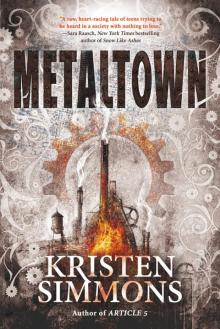 Metaltown
Metaltown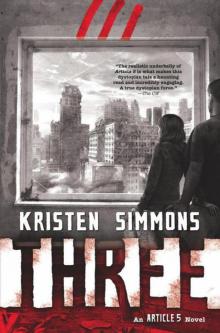 Three
Three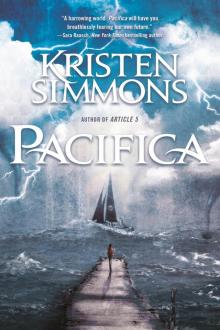 Pacifica
Pacifica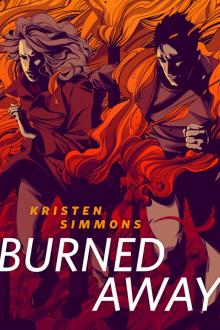 Burned Away
Burned Away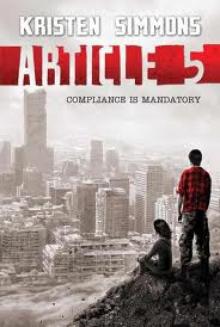 Article 5
Article 5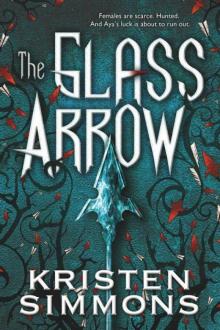 The Glass Arrow
The Glass Arrow Breaking Point
Breaking Point Scammed
Scammed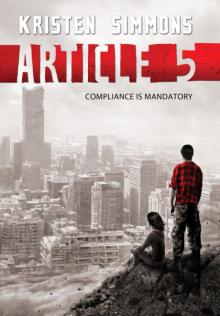 Article 5 a5-1
Article 5 a5-1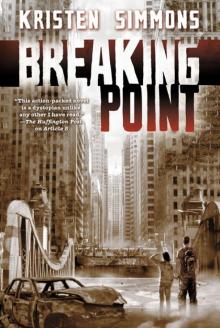 Breaking Point a5-2
Breaking Point a5-2